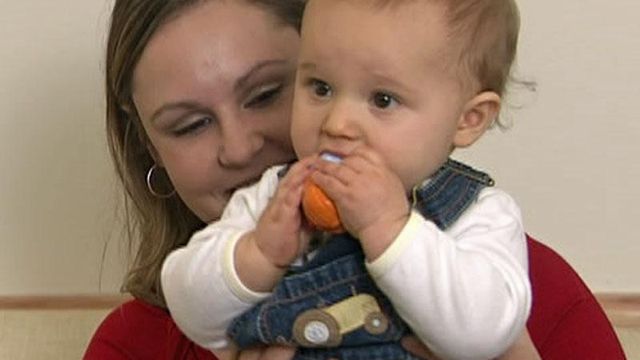UNC offers nation's only inpatient care for postpartum depression
The University of North Carolina-Chapel Hill's School of Medicine offers the only inpatient care in the United States for new mothers suffering from postpartum depression, a common and often untreated illness.
Posted — UpdatedOne in 10 women who give birth will have postpartum depression, according to studies. A few outpatient programs are available for moms who are diagnosed and referred by their doctors, but many women need a higher level of care.
Three months after Clark May gave birth to her son Max, she started having problems.
"First thing I noticed was I stopped sleeping. I was having anxiety, and I wasn't sleeping well," May said.
She had panic attacks. She was often sad and crying and felt that she couldn't leave Max's side. "I wasn't comfortable letting other people take care of him," May said.
All those behaviors are symptoms of postpartum depression, doctors said.
"Some women worry they'll do something to hurt the baby. It interferes with the person's ability to function," said Dr. Samantha Meltzer-Brody, co-director of the Perinatal Psychiatry Program of the UNC Center for Women's Mood Disorders.
There aren't any national recommendations for screening women for postpartum depression, Meltzer-Brody said. "And unless they bring it up, it's not something their doctor or OB (obstetrician) provider will ask about," she added.
There are outpatient treatment programs, but May needed the inpatient services offered at UNC. She stayed two weeks for counseling and help with medication and sleeping.
"Sleep is the most important thing and being able to, sort of, not have a lot to do, so that you can, sort of, have some downtime. And for most women, it's really kind of hard to do that at home," Meltzer-Brody said.
The program has extended visiting hours, so patients have regular contact with family and their babies.
"They let my baby visit me any time," May said. "I think that if I had said in the middle of the night, 'Oh, I need to see him,' that they would let me."
May said she wants other women suffering symptoms of postpartum depression and anxiety to know that they need help and that it's available.
UNC partners with Rex Hospital in Raleigh to run an outpatient clinic for women suffering prenatal and postpartum depression.
• Credits
Copyright 2024 by Capitol Broadcasting Company. All rights reserved. This material may not be published, broadcast, rewritten or redistributed.





